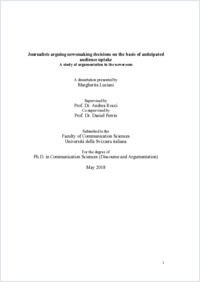Journalists arguing newsmaking decisions on the basis of anticipated audience uptake : a study of argumentation in the newsroom
- Luciani, Margherita
- Rocci, Andrea (Degree supervisor)
- Perrin, Daniel (Degree committee member)
-
21.06.2018
395 p.
Thèse de doctorat: Università della Svizzera italiana, 2018 (jury note: Magna cum laude)
English
This thesis sets out to explore journalists’ anticipatory reasoning on audience uptake, i.e. on the ways in which the audience will react to news. In order to reach this goal, I conduct an argumentative analysis of various types of newsroom activities. The analysis sheds light on journalists’ reasoning processes concerning audience uptake that lead them to broadcast/publish one certain news item instead of another, or on the way they decide to broadcast/publish a news item, starting from their anticipatory inferences. The adopted corpus consists of data gained from two distinct datasets; a) data from a previous project, Ideè Suisse, consisting of TV-journalism data in Swiss German and French, and b) print-journalism data in Italian collected at the newsroom of Corriere del Ticino, the main Italian-language newspaper in Switzerland, in the framework of the project Argumentation in newsmaking process and product. The data consist of videotaped editorial conferences, informal and formal journalist discourses, frame interviews, retrospective interviews, news products and source materials. The contextual and argumentative analysis aims at investigating the distinct aspects involved in the anticipation of audience uptake and at investigating the places of reflection (i.e. editorial conferences, informal meetings and retrospective interviews) wherein certain kinds of standpoints are at stake and particular aspects of audience uptake are anticipated. The anticipated uptake includes 1) anticipation of an emotive effect, of a news 2) anticipation of a cognitive effect, and 3) anticipation of a persuasion. I sketched a typology of journalists’ anticipation of audience uptake in terms of illocutionary, locutionary, and perlocutionary force. On the theoretical level I merge two theories that both aim at studying the human mind from a rational perspective. On the one hand, I use Castelfranchi’s theories on anticipation based on the cybernetic notion of goal, while, on the other hand, I use the Argumentum Model of Topics (Rigotti and Greco Morasso 2011) for the study of the inferential configuration. I connect the fundamental notions of both theories as in a syllogism. Results have shown the noticeable prominence of anticipation of audience emotive uptake, where the object of journalists’ anticipation are the audience emotions. This type of anticipation can be intertwined with cognitive audience uptake anticipation and both types have proven to be subordinated to the anticipation of persuasion, since in the end journalists want to promote public understanding as well as capture audience attention. Results further show that many cases of anticipatory reasoning involved counterfactual reasoning. Counterfactual reasoning focussing on better unrealized scenarios has been found to occur mostly in evaluative editorial conferences. Whereas counterfactual reasoning focused on worse unrealized scenarios mostly occurs in retrospective interviews in which the journalist justifies the goodness of his editorial choices. Empirical evidence of the relationship between invalidation of expectation and counterfactual reasoning is also provided. Finally, I provide evidence of the argumentative foundations of counterfactual reasoning.
- Language
-
- English
- Classification
- Information, communication and media sciences
- License
-
License undefined
- Identifiers
-
- RERO DOC 322768
- URN urn:nbn:ch:rero-006-117460
- ARK ark:/12658/srd1318912
- Persistent URL
- https://n2t.net/ark:/12658/srd1318912
Statistics
Document views: 350
File downloads:
- Texte intégral: 391
